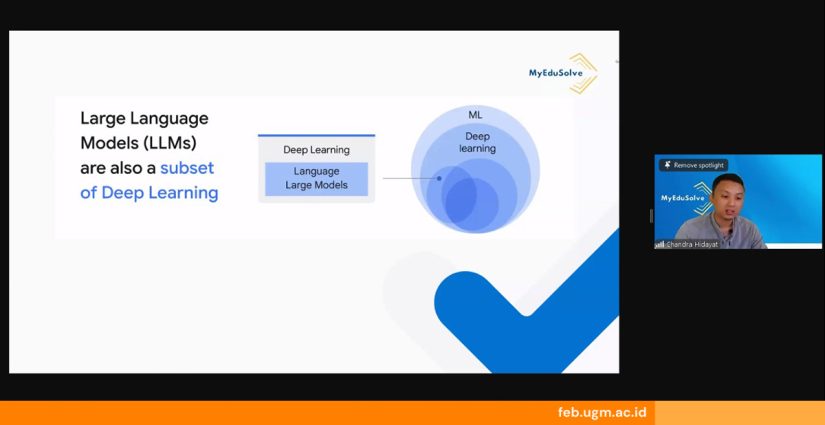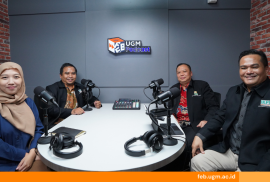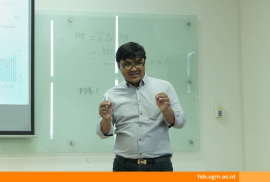
Artificial intelligence (AI) has become an inseparable part of everyday life in today’s era. However, along with the development of technology, controversies have also emerged, particularly concerning the rise of Generative AI (Gen AI). The presence of Gen AI has drawn criticism due to its potential for misuse and ethical violations. Nevertheless, Gen AI can be a highly beneficial tool when used ethically and responsibly, especially for academics and students.
Recognizing the importance of Gen AI literacy, the Career and Student Development Center Unit (CSDU) of FEB UGM, in collaboration with MyEduSolve, held a workshop titled “Generative AI for Academic Excellence and Career Preparation.” The event was conducted online via Zoom Meeting on Friday (May 9, 2025).
Certified GenAI Instructor Chandra Hidayat explained that artificial intelligence refers to a machine or computer system’s ability to think, learn, and make decisions like a human. AI encompasses several branches, including generative AI, designed to create new content such as text, images, code, or music based on previously learned data. Unlike conventional AI that merely analyzes data, Gen AI can produce original content that resembles human work. This technology is powered by deep learning, enabling machines to recognize data patterns and generate output based on user input. As such, the more specific the prompt or data the user provides, the more relevant and high-quality the AI-generated production will be.
Gen AI also sparks debate among creative professionals despite its numerous benefits and potential. With Gen AI, an artist’s distinctive style can be easily replicated, raising ethical concerns and emphasizing the need for clear regulations to prevent future misuse and harm.
Chandra also explained that some AIs, such as ChatGPT, are trained using Large Language Models (LLMs), which are deep learning-based models focused on language. These models can answer questions, translate languages, and generate natural-sounding text without the typical rigidity of machine-generated outputs. However, users must be cautious of hallucinations, a phenomenon where AI produces fictitious or inaccurate information. This is a common issue and can be very misleading, especially if users do not verify the information first. Thus, as responsible users, it’s best not to rely on AI as a primary source of information and to always fact-check for accuracy.
Several AI tools can support daily productivity and tasks. For instance, ChatGPT can be used to create, revise, paraphrase text, and can even be customized to suit specific styles or needs. Meanwhile, Perplexity AI is more suitable for finding data and information with clear and accurate sources, although its language tone remains somewhat stiff.
Google Gemini stands out for its integration with the Google Workspace ecosystem, making it highly useful for business and digital marketing. Microsoft’s Copilot, integrated with the Microsoft 365 ecosystem, is also highly beneficial for enhancing workplace productivity.
Other tools include Taskade, which helps users create to-do lists and map task priorities; Scite, which streamlines research and literature review processes; and Gamma and Tome App, which allow users to create professional instant presentations, although they come with limitations such as fixed file formats, lack of customization, or unappealing visuals. Otter AI is also noteworthy for its high accuracy and real-time audio-to-text transcription capabilities. However, it requires a stable internet connection and limited language support.
Lastly, Chandra addressed the widespread concern that AI will replace human jobs. He highlighted that not all jobs can be automated. Roles requiring high empathy and intuition such as teachers, doctors, and psychiatrists, will continue to need human presence. In contrast, AI development also creates new job opportunities, including data engineering, AI product analyst, and related fields.
“It’s not AI that will replace human jobs, but rather humans who can make the most of AI will be the ones who survive and excel in the future,” he concluded.
Report by: Najwah Ariella Puteri
Sustainable Development Goals








